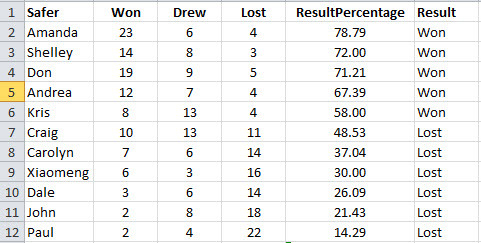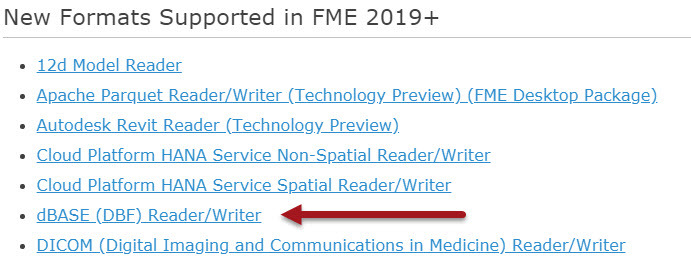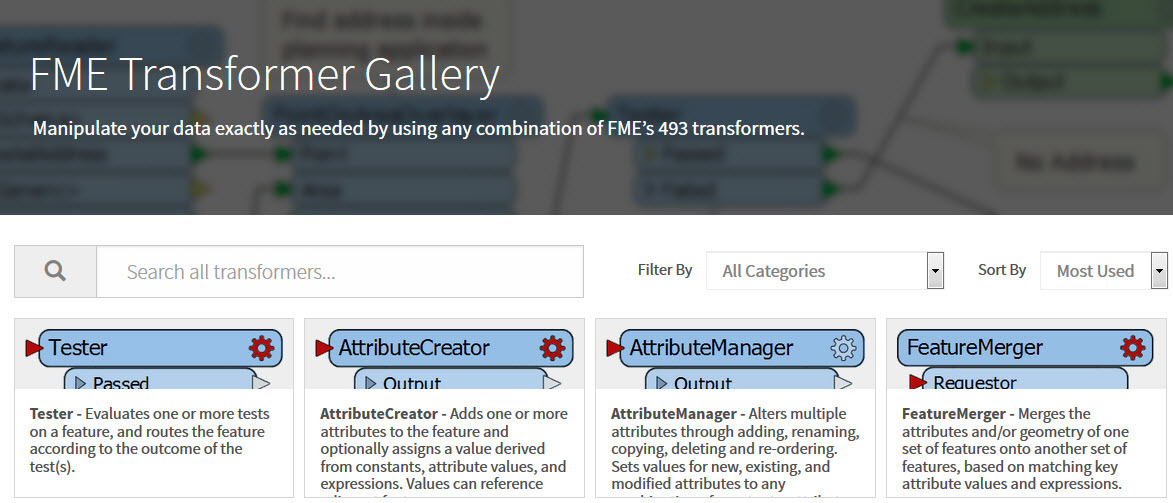Hello FME'ers,
This week's quiz involved challenging Xiaomeng Ren, who is an experienced FME user and involved in our user experience program. Did you have what it takes to win?
Let's see...
Answers1) This database format was introduced in 1983; it is probably the most-used of any FME database, without being selected by users; it only supports one table; we don't read or write indexes; it has no SQL settings; and yet it got flagged as a new format in 2019! What is it?
- Microsoft Access
- Ingres
- ODBC
- MongoDB3
- dBase
It is dBase! Why? Well, let's see...
According to Wikipedia it was introduced in 1983. Is it the most-used FME database? Without anyone knowing? Well, yes, because it's part of a Shapefile. Shapefile is the most-used format, therefore it follows that dBase must be the most-used database!
Each dbf file is a single table; it has some form of indexing, but I don't think we use it; there are no SQL statement parameters; and it was flagged as new in 2019 because it got remade at the same time as the Shapefile reader/writer.
Xiaomeng's Answer: ODBC (Incorrect)
2) The Tester is widely acknowledged as the number one, most-used transformer. Which transformer is currently number two?
- Inspector
- FeatureMerger
- AttributeCreator
- TestFilter
- Creator
The second-most popular transformer is the AttributeCreator, which you can find out on our transformers page:
It's interesting that the AttributeCreator is number two, and the AttributeManager is number three! It's like two political parties splitting the vote. Maybe if we merged them together they would be popular enough to overtake the Tester? Perhaps!
Xiaomeng's Answer: AttributeCreator (Correct)
3) What is the current version number of the FME Server REST API?
- v1
- v2
- v3
- v4
- v5
The current version is v3:
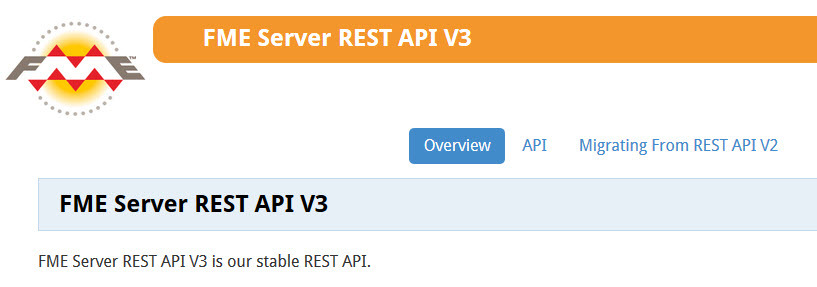
I do happen to know that v4 is now in development. I'm told that one of the intended goals is improved performance, so keep an eye out for that.
Xiaomeng's Answer: v3 (Correct)
4) At the other end of the most-used transformers spectrum, which transformer is currently least-used, at 493 out of 493?
- TopferIndexCalculator
- KinesisSender
- ProjectWiseWSGConnector
- TCLCaller
- GeoRSSFeatureComposer
Well, if you knew where to look to find the second-most used, then you would also know where to find the least-used (least-used in our user feedback, anyway):
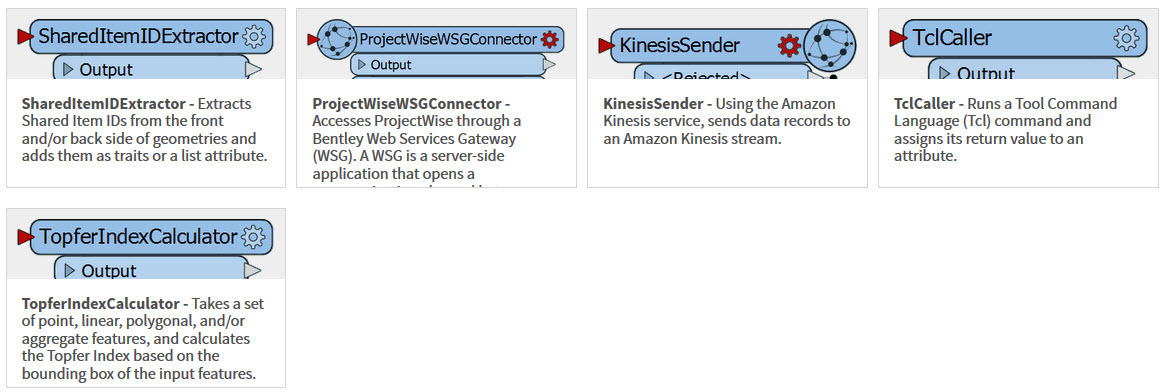
I wouldn't have thought the TclCaller would be that low, but I guess no-one really uses or needs that any longer. Poor Tcl. It's fallen a long way since I first used FME.
I was very impressed that Xiaomeng got this correct without looking (either she's really good, or really lucky)!
Xiaomeng's Answer: TopferIndexCalculator (Correct)
5) When you use a Conditional Value in FME, what can't you set the value to?
- A simple value like a string or number
- A value constructed from a text or arithmetic editor
- The same value it already had
- A command to FME to terminate the translation
- A second, nested, set of conditions
When you use a Conditional Value in FME, you set up the conditions and then set the value for when those conditions pass. The menu looks like this:
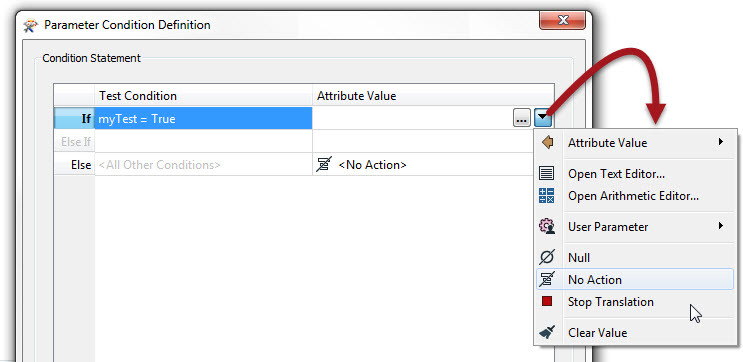
You could enter a plain string or number or, as you can see, use the editor dialogs to make something a little more complicated. There's no restriction that says you can't set it to the same value it had before, but you can use the general options to set it to Null, No Action, or Stop Translation.
The one thing you can't do, is set it to another set of conditions; i.e. you can't nest conditional values.
Xiaomeng's Answer: A second, nested, set of conditions (Correct)
6) An impossible question? There are multiple training courses taking place at the upcoming FME International User Conference. Which one of them am I leading?
- Introduction to FME Desktop
- Dynamic Workflows
- Advanced Attribute and List Handling
- Merging and Joining Database Data
- Best Practices for Transformer Patterns
As is usual, we have a series of training courses taking place the day before the FME user conference. This year we are offering eighteen (18) different options to choose from (you can pick between two and four of these options):
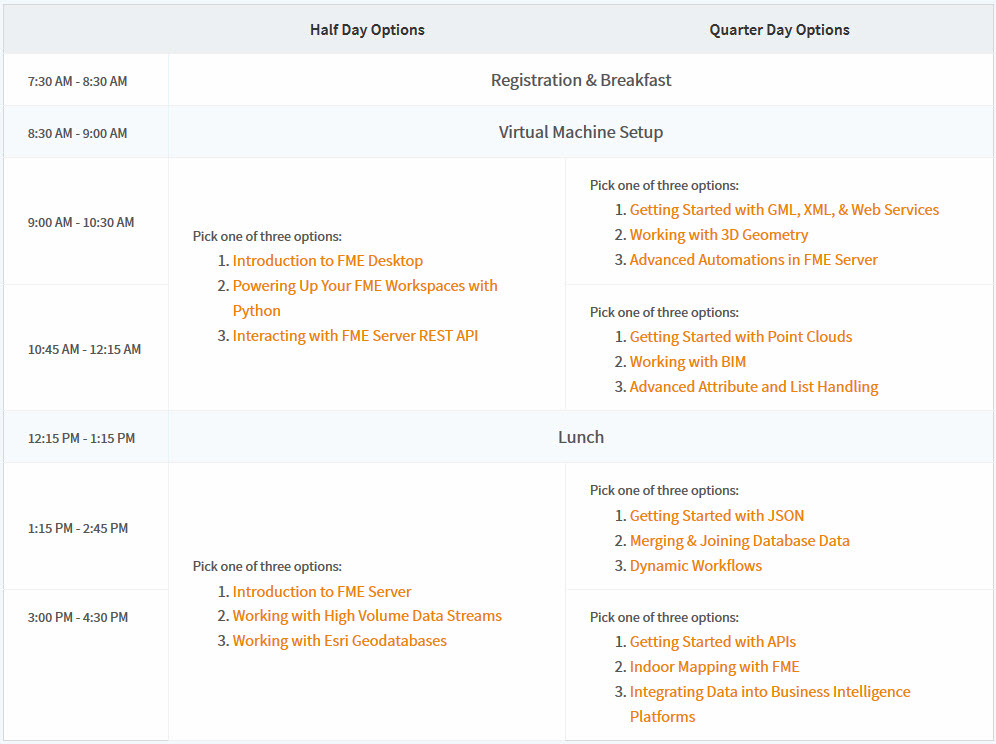
But which one am I leading? It's not a totally impossible question, as some people know, but I didn't think either our users or Xiaomeng would know for sure.
The answer is that it's the afternoon session on Dynamic Workflows!
I'm just writing the content now and I'm planning to make it mostly a "getting started" type course, to get across the concepts and basic techniques. I honestly think the concepts are important, because once you understand those, all of the functionality just falls into place.
Of the other choices, three of them are courses (Intro to FME Desktop, Advanced Attribute and List Handling, and Merging and Joining Database Data), but Best Practices for Transformer Patterns isn't. That is just the sort of thing I would get involved in, if it did, so I don't blame anyone for picking that answer.
Xiaomeng's Answer: Best Practices for Transformer Patterns (Incorrect)
ScoresLet's see the general quiz info and scores:
- Quiz Week: 18 (Mar 2/2020)
- Number of Entries: 25
- Best Score: 6
- Worst Score: 2
- Average Score: 4.5
- Easiest Question: 1 (24)
- Hardest Question: 6 (8)
Hoo! A high average and seven (7) people got 100% correct. Well done.
- Beat Xiaomeng: 16
- Equalled Xiaomeng: 3
- Were Beaten by Xiaomeng: 6
A comprehensive victory, especially when you consider that the Safer got 4/6.
The overall score is now...
- Users 6 Safers 5
Well, aren't you all on a roll?! But I'll get you next week... maybe!
To finish up, here's a league table of your scores (4 or more entries):
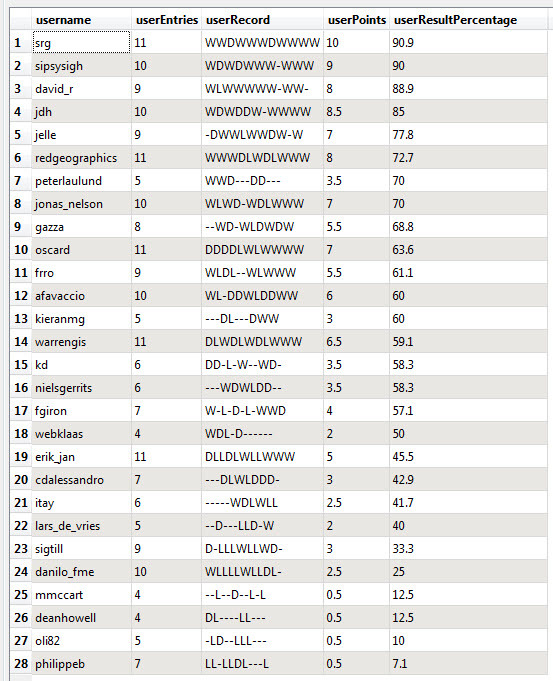
Congrats to @lars_de_vries for his first win. Here's the Safer league table:
